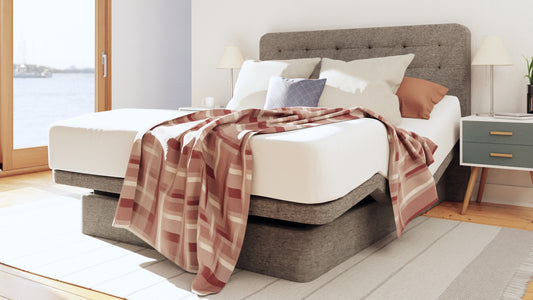As you stare at the ceiling counting sheep all night, you may not be surprised that insomnia is one of the most common sleep problems among older adults—up to 50% report symptoms. As we mature, sleep problems become more commonplace, disrupting our nights, and leaving lasting effects on our daily lives. Restorative sleep takes on added significance with age, impacting our day-to-day activities and energy levels. A good night’s sleep helps us maintain our health and overall well-being. Many of us seek solutions through sleep aids to address our sleep challenges. Let’s explore how sleep aids can offer potential solutions for improving sleep health. Reclaim your nights, so you can wake up refreshed and ready to take on the day. [1]
What Are Sleep Aids and Why Are They Needed?
Sleep aids encompass a range of medications and substances to help you fall asleep, maintain uninterrupted sleep, and improve your sleep quality. From over-the-counter sleep medications to herbal remedies, to those prescribed by your doctor, sleep aids are a sought-after solution to mitigate occasional sleep disturbances, insomnia, and sleep-related disorders. Our sleep patterns can change as we age due to hormones, medical conditions, medications, and lifestyle adjustments. Our sleep may become more fragmented, which can be frustrating—to say the least.
Your first stop might be the grocery store or your local drugstore. Over-the-counter sleep medications are readily available and offer a quick remedy for occasional sleeplessness, especially if you are stressed or just can’t seem to turn off your thoughts. Non-prescription sleep aids typically contain ingredients like antihistamines that induce drowsiness and help you relax. OTC medications are generally considered safe for short-term use. The downside is you can develop a tolerance for them quickly, so they are less effective the longer you take them. We recommend you consult your doctor before using anything that might interfere with your medications or health conditions.
Alternatively, herbal remedies have gained popularity as a natural approach to improving sleep quality. Herbal substances, like valerian, chamomile, and kava, are believed to have sedative effects and can help soothe the mind and body for a more restful night's sleep. Additionally, the popularity of melatonin has been on the rise to help regulate your sleep-wake cycle. By incorporating a melatonin supplement into your nightly routine, people have experienced improved sleep onset and better adaptability to changes in their sleep schedule, like shift work or recovering from jet lag. While melatonin and other herbal remedies may have fewer side effects than pharmaceutical options, it's still a good idea to consult a healthcare professional to ensure they are safe and effective for you.
Prescription sleep aids are more potent medications. Prescribed by a healthcare professional for specific sleep disorders, these medications (often referred to as sedatives, sleeping pills, or tranquilizers) can target different areas of sleep by helping you fall asleep faster or increasing sleep duration. However, these also come with a higher risk of side effects and potential dependency, so these are only recommended for use under medical supervision. [2,3]

Image credit: Pickpik
Are We Getting Less Sleep?
Even in our golden years, older adults require the same amount of sleep as when they were younger, approximately 7-9 hours per night. However, as we age, seniors tend to shift their sleep patterns by going to bed earlier in the evening and waking up earlier in the morning compared to when they were younger. Despite needing more sleep for their health and energy, many older adults face challenges getting a full night of rest.
The reasons behind insufficient sleep are multifaceted, affecting people of all ages. But for older adults, health issues and physical discomfort can hinder a good night’s sleep, while certain medications may also disrupt sleep patterns. Changes to your biological clock or napping during the day can also make falling asleep harder. Regardless of the cause, the lack of quality sleep can lead to adverse consequences—irritability, memory problems, feelings of depression, and an increased risk of falls or accidents.
One of the primary contributors to sleep deprivation among older adults is work-related stress. Many in the over-50 age group are still employed and face demanding responsibilities in their careers, leading to difficulty unwinding and achieving adequate sleep. Additionally, familial obligations, such as caregiving for an aging parent or grandchildren, can further disrupt sleep and increase stress levels. External stressors, like financial concerns, retirement planning, and health issues, may exacerbate the situation and negatively affect sleep quality. Implementing good sleep hygiene or seeking professional assistance from your healthcare provider or a sleep specialist can play a pivotal role in promoting better sleep health for older adults.
Feeling the weight of these responsibilities and life changes, mature adults are turning to sleep aids more than any other demographic. However, it’s important to note that disturbed sleep and waking up tired day after day are not considered a normal part of aging, according to the American Academy of Sleep (AASM). Instead, symptoms should be acknowledged and addressed appropriately with your physician, since lack of sleep can significantly impact physical and mental health. [4,5]
Negative Effects of Sleep Aids
One of the drawbacks of sleep aids is the potential for morning grogginess, abnormal behaviors, or cognitive impairment. Some medications may leave users feeling drowsy and lethargic upon waking, affecting their ability to function optimally during the day or at work. This residual sedation can interfere with daily activities, including driving or performing tasks that require alertness. Cognitive impairment caused by sleep aids can impact memory, attention span, and performance, which can be particularly concerning for those in demanding occupations.
Sleep aids, whether they are prescribed medications or over-the-counter remedies, can be a tempting reprieve from insomnia. However, relying on sleep aids for an extended period can lead to dependence, where the body becomes reliant on the medications to initiate sleep. This dependency poses a potential risk for addiction, making it challenging for users to discontinue without experiencing withdrawal or rebound insomnia. [6]
Natural Sleep Aid Options
Given the disadvantages of sleep aids, some people choose to explore alternative approaches to address sleep issues. Incorporating relaxation techniques, such as mindfulness meditation, deep breathing exercises, and progressive muscle relaxation, can help ease anxiety and stress that can contribute to poor sleep. These practices can facilitate falling asleep naturally and improve mental health. And the solution may be as close as your phone, with helpful apps available to guide you through these techniques.
Lifestyle adjustments can also have a significant impact on sleep quality. Regular exercise improves your physical health and boosts your “feel-good” endorphins that can relieve stress, so you sleep better. Avoiding alcohol and reducing caffeine intake is important because both substances interfere with sleep. Alcohol may initially make you feel drowsy, but it’s found to disrupt the normal sleep cycle, leading to fragmented sleep. Caffeine is a stimulant and can interfere with falling asleep and reduce sleep duration. Also, paying attention to nutrition and maintaining a balanced diet can positively influence sleep quality. And lastly, limiting screen time before bedtime is necessary due to the impact of blue light emitted by electronic devices. Blue light can suppress the production of melatonin, a hormone that regulates sleep-wake cycles.
For those suffering from insomnia, cognitive behavioral therapy (CBT-I) can be a highly effective alternative to sleep aids. CBT-I is a structured therapeutic approach designed to tackle the root causes of insomnia and foster better sleep without relying on sleep aids. Through a combination of techniques, CBT-I helps individuals modify their thoughts, behaviors, and sleep habits. [7,8]
Other Sleep Aid Alternatives
Maintaining a consistent sleep schedule, creating a calming bedtime routine, and ensuring a comfortable sleep environment can promote better sleep quality without the need for medication. Elevate your level of comfort and support with the Dawn House bed system, catering to the unique sleep requirements of mature adults. Our Dawn House bed can change the game on how you sleep.
No more tossing and turning in search of the perfect spot. Customize your sleep position precisely to your comfort preference. With a voice-activated command or the touch of a button, the bed adjusts to suit your needs. The bed system’s integrated health monitoring capabilities offer valuable insights into your sleep patterns. By tracking your sleep data, you gain an understanding of your sleep quality and can proactively manage any sleep-related concerns. And discover peace of mind with our safety features that provide stability to make getting in and out of bed easier and reduce the risk of falls. The Dawn House bed offers a comfortable and stylish solution to achieve a great night’s sleep.
Featured image credit: MarcusAurelius-pexels
References:
- https://www.ncbi.nlm.nih.gov/pmc/articles/PMC5847293/
- https://www.mayoclinic.org/healthy-lifestyle/adult-health/expert-answers/sleep-aids/faq-20058393
- https://jamanetwork.com/journals/jama/fullarticle/2788539
- https://www.cdc.gov/sleep/about_sleep/how_much_sleep.html
- https://aasm.org/sleep-problems-are-more-likely-as-we-get-older/
- https://www.sleepfoundation.org/sleep-aids/side-effects-of-sleeping-pills
- health.harvard.edu/staying-healthy/blue-light-has-a-dark-side
- https://www.ncbi.nlm.nih.gov/pmc/articles/PMC6796223/



